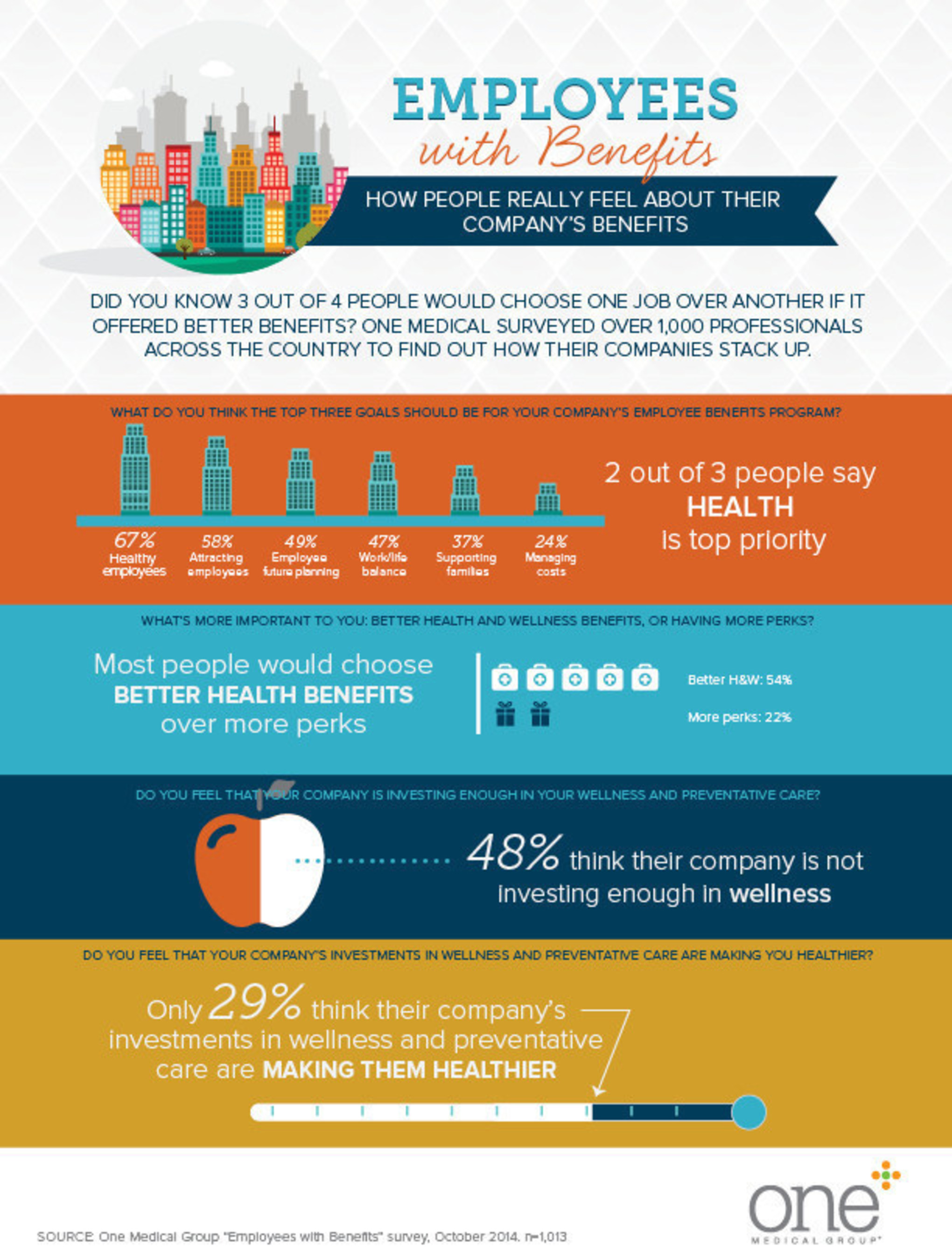By USDR
One Medical Group, the fastest-growing primary care system in the country, today shared the results of a new survey of over 1,000 professionals regarding their opinions, desires and perceptions about their companies’ employee benefits program. The data indicates that health benefits can make a significant difference in people’s job satisfaction and may even impact their choice of jobs. The study also suggests that despite offering health insurance options, many companies still have some work to do when it comes to keeping their employees healthy and happy.
Key survey findings include:
1. Benefits can make a big difference in people’s job satisfaction.
Almost universally, working professionals say that employee benefits have a big impact on their workplace satisfaction. 64 percent say that employee benefits are “very important” to how they feel about their job and their employer, and 31 percent say benefits are “somewhat important” to how they feel.
While benefits matter a lot for employees of all ages, they’re most important when it comes to attracting and retaining seasoned professionals. The study shows that 69 percent of workers who are over 60 rate benefits as “very important”, as do 68 percent of those aged 45-60, 63 percent of 30-40-year-olds and 55 percent of 18-29-year-olds.
Employee benefits can also make a big difference for people when they’re deciding between competing job offers, with 72 percent saying they might choose one job over another if it offered better employee benefits.
2. People want their employers to focus on their health.
When it comes to which types of benefits would be most valued, respondents voiced a strong preference for health benefits. In fact, 2 out of 3 professionals would rather have better health and wellness benefits than more perks. This preference is more pronounced for professionals over the age of 45, 3 out of 4 of whom would choose better health benefits over more perks.
The study also indicates that professionals want their employers to play a bigger role in their health and wellness. A majority of respondents (67 percent) believe that keeping them healthy should be one of the top goals of their company’s benefits program.
And yet, the data also shows that only 49 percent think that health is actually a top priority for their company. Many more people (67 percent) believe their employer is focused on managing costs.
3. Companies aren’t doing enough to keep their employees healthy.
According to the survey, many employers offer a range of different health and wellness benefits. Most companies are providing medical insurance (88 percent), and more than half are investing in health and wellness programs. The most common programs offered include employee assistance programs (45 percent), on-site vaccinations (45 percent), fitness benefits (31 percent), workshops (31 percent) and on-site health screening (25 percent).
But the data also suggests that companies should carefully review which of these programs have a meaningful impact, because in spite of these programs, many professionals still believe that their employer isn’t doing enough to keep them healthy. Only about half of survey respondents (52 percent) say their company is making sufficient investments in their wellness and preventative care, and only 29 percent think their company’s health and wellness programs are actually making them healthier.
For more findings from the study, please visit http://page.onemedical.com/enterprise_benefits.
About the Survey
In September and October 2014, One Medical Group worked with SurveyMonkey to survey 1,000 professionals regarding their opinions, desires and perceptions about their companies’ employee benefits. People working at companies of all sizes across 20 different industries were represented in the survey, with respondents ranging in age from 18 to over 60. The majority of respondents (73 percent) said they had a college degree or higher, and more than 50 percent reported annual income of $100,000 or higher. Responses were evenly split between men and women.
About One Medical Group
One Medical Group is the fastest-growing primary care system in the country, with convenient locations in Boston, Chicago, Los Angeles, New York, San Francisco and Washington, DC. One Medical’s high-quality, modern primary care service was designed for the professional lifestyle, with same-day and next-day appointments that start on time, 24/7 virtual care, night and weekend hours, mobile scheduling and prescription refills and more. One Medical’s enterprise customers are able to decrease their overall health care costs, while improving employee productivity and well-being.



Average Rating